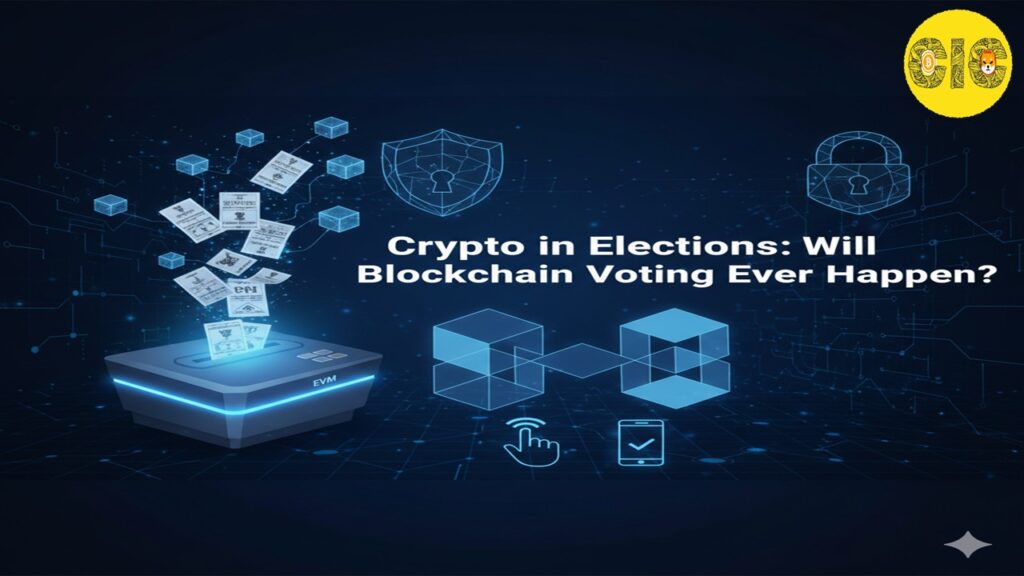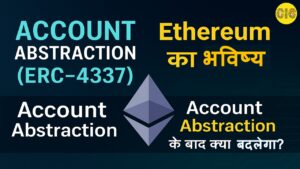
Crypto in Elections
Crypto in Elections: क्या Blockchain Voting लोकतंत्र का भविष्य है? फायदे, चुनौतियाँ, केस स्टडी और सुरक्षा समाधानों पर विस्तृत विश्लेषण।
Table of Contents
Crypto in Elections: चुनाव और तकनीक का बदलता परिदृश्य
भारत समेत पूरी दुनिया में चुनाव लोकतंत्र की रीढ़ माने जाते हैं। लेकिन चुनाव प्रक्रिया हमेशा से विवादों, पारदर्शिता पर सवालों और सुरक्षा चिंताओं से जुड़ी रही है।
- कहीं EVM (Electronic Voting Machine) पर अविश्वास,
- तो कहीं Postal Ballot में गड़बड़ी,
- और कभी मतदाता सूची में गड़बड़ी।
इसी बीच, एक नया सवाल उठ रहा है —
👉 क्या Blockchain Technology चुनाव प्रक्रिया को पूरी तरह पारदर्शी, सुरक्षित और भ्रष्टाचार-मुक्त बना सकती है?
Blockchain Voting का आधार – यह कैसे काम करेगा?
Blockchain Voting का मतलब है कि हर वोट एक Cryptographic Transaction की तरह Blockchain पर रिकॉर्ड हो।
- हर वोट = एक Block
- Chain = सारे वोट मिलकर एक Immutable Ledger
- कोई Vote Delete या Alter नहीं किया जा सकता
मुख्य तकनीकी फीचर्स:
- Immutability – एक बार दर्ज वोट बदला नहीं जा सकता।
- Transparency – पूरी वोटिंग सार्वजनिक Blockchain पर दिख सकती है।
- Security – Cryptographic Keys से Voter Authentication।
- Anonymity + Privacy – Voter की पहचान सुरक्षित रहती है।
चुनावों में Blockchain के संभावित फायदे
✅ 1. पारदर्शिता
हर वोट सार्वजनिक रूप से दर्ज होगा, कोई छेड़छाड़ नहीं।
✅ 2. विश्वास
EVM या Manual Counting पर अविश्वास खत्म होगा।
✅ 3. Accessibility
NRI और Remote Areas के लोग Mobile Voting कर सकेंगे।
✅ 4. Cost-Effectiveness
Polling Booths और Paperless Voting से खर्च घटेगा।
✅ 5. Real-Time Counting
Blockchain पर Votes की गिनती तुरंत हो सकती है।
चुनौतियाँ और समस्याएँ
❌ 1. Digital Divide
ग्रामीण इलाकों और कम पढ़े-लिखे लोग इसे अपनाने में हिचक सकते हैं।
❌ 2. Cyber Attacks का खतरा
Nodes या Wallets Hack होने पर समस्या।
❌ 3. Voter Privacy बनाम Transparency
वोट पब्लिक Ledger पर दिखे तो पहचान कैसे सुरक्षित रहे?
❌ 4. Large-Scale Scalability
भारत जैसे देश में करोड़ों वोट Blockchain पर रिकॉर्ड करना भारी चुनौती है।
❌ 5. कानूनी और राजनीतिक बाधाएँ
सभी दल क्या इसे मानेंगे? क्या कानून इसकी अनुमति देगा?
दुनिया में Blockchain Voting के प्रयोग
🏛️ एस्टोनिया (Estonia)
- सबसे आगे रहा है Digital Governance में।
- हालांकि पूर्ण Blockchain Voting अभी नहीं हुआ, लेकिन Digital ID और Internet Voting लागू है।
🏛️ अमेरिका (West Virginia)
- 2018 में Military और Overseas Voters के लिए Blockchain Voting Pilot Project हुआ।
- Mixed Response मिला।
🏛️ भारत
- Election Commission और IIT Madras ने Remote Voting via Blockchain पर प्रयोग किए।
- लेकिन अब तक Large Scale पर Implementation नहीं हुआ।
Blockchain Voting vs EVM vs Paper Ballot
| Voting System | Pros | Cons |
|---|---|---|
| Paper Ballot | परंपरागत, Simple | Frauds, Costly, Time-Consuming |
| EVM | तेज़, Less Costly | Hacking की आशंका, विश्वास की कमी |
| Blockchain Voting | Tamper-Proof, Transparent, Remote Access | Scalability, Digital Divide, Legal Issues |
अगर Blockchain Voting लागू हुआ तो क्या बदलेगा?
- मतदाता घर बैठे मोबाइल से वोट डाल सकेगा।
- NRI भी सीधे भाग ले सकेंगे।
- Counting तुरंत होगी।
- Election Results पर विवाद कम होंगे।
- लेकिन Digital Divide नए प्रकार की असमानता भी ला सकता है।
Real-World Tools और Solutions
- Voatz App (USA) – Military Voting Pilot
- Follow My Vote (Blockchain Voting Startup)
- India’s Remote Voting Prototype (IIT Madras + ECI)
- Agora (Blockchain Voting Platform)
विस्तृत Case Studies: Blockchain Voting के वास्तविक प्रयोग
📌 Case Study 1: West Virginia (USA) – 2018 Pilot Project
- प्रयोग: Military और Overseas Voters के लिए Blockchain Voting App (Voatz) का इस्तेमाल।
- कैसे हुआ:
- Voters ने अपने Mobile App से Biometric Verification किया।
- Blockchain पर Vote Recorded हुआ।
- नतीजा:
- लगभग 150 मतदाताओं ने भाग लिया।
- Transparency बढ़ी, लेकिन Security Concerns उठे।
- समस्या: कुछ Cybersecurity Researchers ने कहा कि App में Vulnerabilities थीं।
📌 Case Study 2: Moscow, Russia – 2019 Municipal Elections
- प्रयोग: Blockchain आधारित Online Voting।
- फायदा:
- Remote Voting का Option मिला।
- नुकसान:
- Researchers ने Cryptographic Flaws खोज लिए।
- Voter Privacy पर सवाल उठे।
📌 Case Study 3: एस्टोनिया (Estonia) – Digital Democracy Model
- प्रयोग: Estonia दुनिया का पहला देश है जिसने e-Governance को सफल बनाया।
- Digital ID: हर नागरिक को Digital Identity मिली।
- Internet Voting: National Elections में भी Online Voting का Option।
- Blockchain प्रयोग: Health Records, Business Registry और Governance Data Blockchain पर।
- नतीजा:
- Estonia Global Leader बना e-Democracy में।
- लेकिन अब तक पूरी तरह Blockchain Voting नहीं लागू।
📌 Case Study 4: भारत – Election Commission और IIT Madras का Prototype
- प्रयोग: Blockchain-आधारित Remote Voting System पर काम।
- लक्ष्य:
- Migrant Workers और NRI Voting को आसान बनाना।
- कैसे:
- Voter Biometric Authentication करेगा।
- Vote Blockchain पर Recorded होगा।
- Counting Real-Time होगी।
- स्थिति: अभी Pilot Stage पर।
- समस्या: Large-Scale पर Implementation में Time लगेगा।
Real-World Tools & Security Solutions in Blockchain Voting
Blockchain Voting सिर्फ एक थ्योरी नहीं है, बल्कि इसके लिए कई टेक्नोलॉजिकल टूल्स, सिक्योरिटी फ्रेमवर्क और Solutions मौजूद हैं। आइए इन्हें विस्तार से समझते हैं:
🔹 1. Voatz (USA)
- क्या है: एक Mobile Blockchain Voting App।
- प्रयोग: West Virginia (2018) और Utah (2020) में Remote Voting।
- सिक्योरिटी फीचर्स:
- Multi-Factor Authentication (Biometric + Device Verification)।
- Votes Blockchain पर Encrypted Form में Stored।
- चुनौतियाँ:
- कुछ Researchers ने Vulnerabilities बताईं।
- Experts कहते हैं कि Large-Scale पर Deploy करना Risky है।
🔹 2. Agora (Switzerland)
- क्या है: Blockchain Voting Technology Provider।
- प्रयोग: Sierra Leone (2018 Presidential Elections)।
- फायदे:
- Transparency – Results Public Blockchain पर Verified।
- Reduced Fraud।
- नुकसान:
- Limited Scale पर प्रयोग हुआ।
- पूरी Election Process Blockchain पर नहीं, सिर्फ Counting।
🔹 3. Follow My Vote (USA)
- क्या है: Decentralized Online Voting System।
- फायदे:
- पूरी तरह Blockchain आधारित।
- Voter अपने Vote को Verify कर सकता है बिना Anonymity तोड़े।
- विशेषता:
- Open-Source Code।
- Audit-Friendly System।
🔹 4. Polys (by Kaspersky Lab, Russia)
- क्या है: Secure Blockchain Voting Platform।
- प्रयोग: Universities, Organizations और Government Entities में।
- फायदे:
- Cryptographic Security।
- Online और Offline दोनों Mode।
- उपयोग:
- Corporate Elections।
- Student Unions।
🔹 5. ElectionGuard (Microsoft, USA)
- क्या है: End-to-End Verifiable Voting Software।
- विशेषताएँ:
- Open-Source।
- Blockchain पर आधारित नहीं, लेकिन Blockchain Compatible।
- Voter Verification Codes।
- फायदे:
- Any Voting Machine के साथ Integrate हो सकता है।
🔹 6. भारत का Blockchain Prototype (IIT Madras + Election Commission)
- क्या है: Remote Voting System for Migrant Workers।
- कैसे काम करेगा:
- Voter का Biometric Authentication।
- Vote Blockchain पर Secure रूप से Stored।
- Counting Automated और Tamper-Proof।
- स्थिति: अभी Lab-Level पर Testing।
- भविष्य: अगर सफल हुआ तो भारत पहला लोकतांत्रिक देश होगा जहाँ Blockchain-Based Remote Voting लागू होगा।
🔑 सिक्योरिटी Solutions की मुख्य परतें
Blockchain Voting तभी सफल होगी जब इन Layers पर Security लागू की जाए:
- End-to-End Encryption (E2EE): Vote Cast होने से लेकर Count होने तक Secure रहना।
- Zero-Knowledge Proofs (ZKP): Voter Verify कर सके कि Vote Count हुआ, लेकिन उसकी पहचान गुप्त रहे।
- Multi-Factor Authentication (MFA): Aadhaar + Biometric + OTP जैसी Layers।
- Decentralized Nodes: Votes को कई Independent Nodes पर Store करना ताकि Manipulation असंभव हो।
- Audit Trail: Election Commission और Public दोनों Results Verify कर सकें।
Practical Tips & Guidelines for Blockchain Voting
Blockchain Voting का सपना तभी सच होगा जब Voters, Election Bodies और Governments सभी मिलकर Practical Steps उठाएँ।
🔹 1. Voters के लिए सुझाव
- डिजिटल लिटरेसी बढ़ाएँ
- हर वोटर को Mobile Apps, OTP, Biometrics और Online Verification जैसी बेसिक डिजिटल स्किल्स आनी चाहिए।
- ग्रामीण और अशिक्षित इलाकों में Awareness Campaigns चलाए जाएँ।
- Phishing और Fake Apps से सावधान रहें
- सिर्फ Government Verified Voting App डाउनलोड करें।
- किसी भी Suspicious Link या Call पर अपनी Voting Details न डालें।
- Regular Security Updates अपनाएँ
- Mobile Phone और Apps को हमेशा Latest Version में रखें।
- Antivirus और VPN का प्रयोग करें।
- अनामिता (Anonymity) बनाए रखें
- कभी भी किसी को यह न बताएं कि आपने किसे वोट दिया।
- Social Media पर Voting Screenshots शेयर न करें।
🔹 2. Election Bodies (Election Commission) के लिए सुझाव
- Pilot Projects से शुरुआत
- पहले University Elections, Corporate Votes और Local Panchayat चुनावों में Blockchain Voting टेस्ट करें।
- धीरे-धीरे National Elections में लाएँ।
- Cybersecurity Experts की टीम बनाएँ
- Ethical Hackers, Cybersecurity Professionals और Blockchain Experts को शामिल करें।
- Regular Penetration Testing कराएँ।
- Hybrid Voting System अपनाएँ
- सिर्फ Blockchain नहीं, बल्कि Paper Audit Trail भी रखा जाए।
- इससे Transparency और Trust दोनों बढ़ेंगे।
- Voter Training Programs
- Training Camps चलाएँ।
- Regional Languages में Mobile Voting Guides तैयार करें।
- International Collaboration
- Estonia, USA और Switzerland जैसे देशों से Best Practices सीखें।
- Global Standards के आधार पर Voting Protocols तैयार करें।
🔹 3. Governments के लिए सुझाव
- Legal Framework तैयार करें
- Blockchain Voting को मान्यता देने वाले Law पास करें।
- Data Privacy और Anonymity को Legal Protection दें।
- Digital Infrastructure मजबूत करें
- हर गाँव तक High-Speed Internet पहुँचाएँ।
- Data Centers और Blockchain Nodes सेटअप करें।
- Public-Private Partnerships
- Tech Companies जैसे Microsoft, IBM, Infosys, TCS आदि के साथ मिलकर Secure Voting Platforms बनाएँ।
- Transparency और Accountability
- Voting Data का हिस्सा Public Blockchain पर Open-Source हो।
- Election Results Independent Auditors द्वारा Verify हों।
🔹 4. International Lessons (दुनिया से सीख)
- एस्टोनिया (Estonia): 2005 से ही Online Voting कर रहा है। Strong Digital ID System से Fraud लगभग Zero है।
- स्विट्ज़रलैंड (Switzerland): 2019 में Blockchain Voting Pilot किया।
- भारत (India): Digital India और Aadhaar जैसी पहल पहले से मौजूद हैं, जिन्हें Blockchain Voting में Integrate किया जा सकता है।
🔑 Practical Reality Check
- Blockchain Voting आसान नहीं है।
- Challenges:
- Cyber Attacks
- Digital Divide
- Political Resistance
- लेकिन सही दिशा और सही Tools अपनाने पर यह Electoral Revolution ला सकता है।
🚀 Future Scenarios: Blockchain Voting का भविष्य
Blockchain Voting सिर्फ एक तकनीकी सपना नहीं, बल्कि आने वाले समय की लोकतांत्रिक ज़रूरत भी है। कुछ संभावित परिदृश्य इस प्रकार हैं:
🔹 1. Hybrid Voting Model
- शुरुआती वर्षों में Blockchain Voting पूरी तरह से लागू नहीं होगी।
- इसका इस्तेमाल Paper Ballot + EVM + Blockchain Voting (Remote) के संयोजन के रूप में होगा।
- इससे Voter Confidence बढ़ेगा और Transition Smooth होगा।
🔹 2. AI और Blockchain का Integration
- AI आधारित Fraud Detection Systems Blockchain Voting Platforms पर लागू होंगे।
- AI suspicious voting patterns को तुरंत पकड़ सकेगा।
- इससे Election Commission को Real-Time Alerts मिलेंगे।
🔹 3. Quantum Computing का प्रभाव
- आने वाले वर्षों में Quantum Computers मौजूदा Encryption तोड़ सकते हैं।
- Blockchain Voting को Quantum-Resistant Cryptography अपनानी होगी।
- सरकारों को पहले से इस पर काम शुरू करना होगा।
🔹 4. Global Standards और International Collaboration
- UN और Global Election Monitoring Agencies Blockchain Voting के Standards बनाएँगी।
- भारत जैसे देशों में Election Commission इन Standards को अपनाकर Transparency बढ़ा सकेगा।
🔹 5. Grassroot Democracy में बदलाव
- Blockchain Voting का असली प्रभाव गाँव और कस्बों में दिखेगा।
- Migrant Workers और Women Voters को घर बैठे वोट डालने की सुविधा मिलेगी।
- इससे Voter Turnout रिकॉर्ड स्तर पर पहुँचेगा।
🔹 6. Trustless Democracy का उदय
- Blockchain Voting से चुनावी प्रक्रिया में Trust किसी व्यक्ति या संस्था पर निर्भर नहीं रहेगा।
- Trust अब Mathematics और Cryptography पर आधारित होगा।
- यह लोकतंत्र का सबसे पारदर्शी रूप हो सकता है।
🏁 निष्कर्ष: क्या Blockchain Voting हकीकत बनेगी?
Blockchain Voting चुनावी प्रक्रिया में एक क्रांतिकारी बदलाव ला सकती है।
- यह Transparency (पारदर्शिता) बढ़ाएगी।
- यह Fraud और Rigging की संभावनाएँ घटाएगी।
- यह Voter Turnout बढ़ाएगी, खासकर युवाओं, NRIs और Migrant Workers के बीच।
लेकिन चुनौतियाँ भी कम नहीं हैं:
- Digital Divide (हर किसी के पास Smartphone और Internet नहीं है)।
- Cybersecurity Threats (Hackers और Malware Attacks)।
- Political Resistance (कुछ पार्टियाँ पारदर्शिता से डर सकती हैं)।
👉 इसीलिए सही रास्ता होगा कि Blockchain Voting को धीरे-धीरे, Pilot Projects और Hybrid Models के ज़रिए लागू किया जाए।
भारत के लिए यह एक लंबी यात्रा होगी, लेकिन अगर Digital India, Aadhaar और UPI जैसे Projects सफल हो सकते हैं, तो Blockchain Voting भी आने वाले दशक में हकीकत बन सकती है।
FAQs: Blockchain Voting और चुनावों से जुड़े सवाल
क्या Blockchain Voting भारत में 2025 तक संभव है?
👉 अभी तक यह Pilot Stage पर है। IIT Madras और Election Commission मिलकर Prototype बना रहे हैं। 2025 तक बड़े पैमाने पर लागू होना मुश्किल है, लेकिन Local Elections या Migrant Workers के लिए Remote Voting शुरू हो सकता है।
क्या Blockchain Voting पूरी तरह सुरक्षित है?
👉 Blockchain खुद Secure है, लेकिन Voting Apps और Devices Vulnerable हो सकते हैं। अगर Strong Encryption, Biometric Authentication और Paper Audit Trail साथ में हों तो Security बहुत बढ़ जाती है।
क्या Blockchain Voting में गुमनामी (Anonymity) बनी रहेगी?
👉 हाँ, Blockchain Zero-Knowledge Proofs जैसी Techniques इस्तेमाल करता है जिससे वोटर की पहचान गुप्त रहती है, लेकिन उसकी वोटिंग Count हो जाती है।
अगर Internet न हो तो Blockchain Voting कैसे होगी?
👉 इसके लिए Offline Voting Solutions भी Research में हैं, जहाँ Votes पहले Securely Local Device पर Store होंगे और बाद में Blockchain पर Sync होंगे।
क्या Voter अपनी Vote History देख पाएगा?
👉 Voter केवल Verify कर पाएगा कि उसका Vote Cast हुआ और Count में शामिल हुआ, लेकिन यह नहीं देख पाएगा कि उसने किसे वोट दिया (Anonymity बनाए रखने के लिए)।
क्या Blockchain Voting से चुनाव की लागत (Cost) कम होगी?
👉 हाँ, Printing, Transportation और Booth Management पर होने वाला खर्च बहुत कम होगा। लेकिन शुरुआती Infrastructure Setup (Blockchain Nodes, Servers, Biometric Devices) महँगा होगा।
क्या Blockchain Voting से Booth Capturing और Rigging खत्म हो जाएगी?
👉 काफी हद तक हाँ। क्योंकि वोटर्स कहीं से भी वोट डाल सकते हैं, और हर वोट Blockchain पर Immutable तरीके से रिकॉर्ड होता है।
क्या राजनीतिक पार्टियाँ Blockchain Voting का विरोध करेंगी?
👉 कुछ हद तक हाँ। क्योंकि पारदर्शिता (Transparency) बढ़ने से Manipulation की संभावनाएँ घटेंगी। लेकिन धीरे-धीरे Parties भी इसे अपनाएँगी।
क्या NRI और Migrant Workers Blockchain Voting से फायदा उठा पाएंगे?
👉 बिल्कुल। Blockchain Voting का सबसे बड़ा लाभ यही है कि जो लोग अपने Home Constituency में मौजूद नहीं हैं, वे Remote Voting कर पाएंगे।
क्या Blockchain Voting सिर्फ चुनावों तक सीमित रहेगी?
👉 नहीं। इसका इस्तेमाल University Elections, Corporate Board Voting, Housing Society Elections और Online Polls में भी किया जा सकता है।
Also Read:-






















